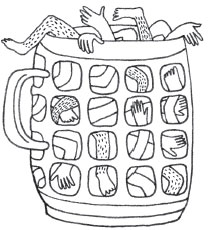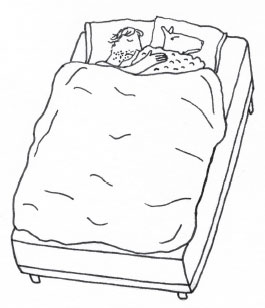


It’s all right to drink like a fish
– if you drink what a fish drinks
(1938)
After your meal, what could be better than a cup of tea. Just make sure you’ve remembered to warm the pot and observe all the other niceties:
to drown the miller to put too much water into tea (the supply of water is so great that even the miller, who uses a water wheel, is drowned with it)
stranger (Sussex dialect) a single tea-leaf floating in a cup of tea
laptea (US slang) a crowded tea party where guests sit in each other’s laps
to smash the teapot (late 19C) to abandon one’s pledge of abstinence from alcohol (the symbolic rejection of tea as one’s sole liquid stimulant)
In Britain the drinking of alcohol has always been, for better or worse, at the heart of the community. The Romans had tabernae (the origin of our word tavern), which turned into the Anglo-Saxon alehouses, where a brewer would put a green bush up on a pole when the ale was ready to drink:
kiddleywink (1830) an unlicensed public house
build a sconce (18C) to run up a large bill at a tavern especially when one has no intention of paying
brendice (1673) a cup in which a person’s health is drunk
spit chips (Australian slang 1901) extreme thirst (from the idea of having dry wood in your mouth)
flairing (Sydney slang) the action of bartenders of balancing, catching, flipping, spinning or throwing bottles, glasses, napkins or straws with finesse and style
The traditional pint comes in many forms:
arms and legs (UK slang 19C) weak beer (i.e. a drink that has no body)

nippitatum (1576) exceptionally strong beer
barbed wire (Australian slang, Darwin) Four X beer (from the xxxx symbol)
parson’s collar (1940s) the froth on top of a glass of beer
neckum, sinkum and swankum (Berkshire) the three draughts into which a jug of beer is divided
Though for refined types more Continental beverages may be preferred, whatever their quality:
supernaculum (1592) the finest wine, which is so good it is drunk to the last drop, referring to the custom of turning over a drained glass and letting the last drop of wine fall onto the thumbnail (from the Latin ‘upon the nail’)
butler’s perks (UK euphemism) opened but unfinished bottles of wine
beeswing (1860) the scum found on the surface of aged wine
balderdash (1611) adulterated wine
In Tudor times drink actually meant to smoke tobacco, something you could once do inside the bar. Now the misocapnists (1839), those who hate the smell of smoke, are in charge, so that’s a pleasure restricted to the pavements outside:
smirting (US slang New York) flirting between people who are smoking cigarettes outside a pub, office etc.
vogueress (Polari slang) a female smoker
casablanca (Tommies’ slang 1914–18) the last one, especially of cigarettes
doofer (workmen’s slang b.1935) half a cigarette
toss the squares (US black slang) to pass a packet of cigarettes
whiffler (1617) a smoker of tobacco
Take it or leave it, boozing is a serious business:
cagg (UK military slang b.1811) a solemn vow or resolution used by private soldiers not to get drunk for a certain time
parson palmer (late 18C) a term of reproach, to one who stops the decanter circulating by preaching over his liquor (as was done by a parson of that name whose cellar was under his pulpit)
duffifie (Aberdeenshire) to lay a bottle on its side for some time, after its contents have been poured out, so that it may be completely drained of the few drops remaining
Just make sure your companions understand the importance of paying their way:
to raddle someone’s toe (Australian late 19C) to request someone to buy a round of drinks
twizzling (Sussex) spinning a pointer on a pub ceiling to decide who should buy the next round
decorate the mahogany (Hobo slang) to buy the drinks; to line the bar with thirsty throats and brimming glasses
shot-clog (1599) an unwelcome drinking companion tolerated because he pays for the drinks
Soon, if you’re not exactly zig-zag – Tommies’ slang from the First World War for the state where it’s impossible to walk in a straight line – the booze will certainly be making itself felt:
hozzy nozzy (Rutland) not quite drunk
bleezed (Scotland 19C) the state of one on whom intoxicating liquor begins to operate: especially describing the change produced in one’s facial expression
cherubimical (Benjamin Franklin 1737) benevolently drunk
tenant in tail (mid 17C) one whose drunkenness promotes indiscriminate displays of affection
whiffled (P. G.Wodehouse: Meet Mr Mulliner 1927) drunk
In Lincolnshire they marked out four distinct phases of intoxication. A man was sheep drunk when he was merry and easily handled; then lion drunk when he was brave and boastful; ape drunk when he got up to silly, irresponsible tricks; and finally sow drunk when he fell to the ground in an alcoholic stupor.
Sailors are legendary for their drinking prowess but watch out for these two:
admiral of the narrow seas (early 17C) a drunkard who vomits over his neighbour
vice admiral of the narrow seas (1811) a drunken man that pisses under the table into his companions’ shoes
Being drunk means never having to say you’re sorry, until the next morning of course when you forswear alcohol for tea again:
take a sheep-bed (Wiltshire) to lie down like a sheep to sleep in a grass-field, till one is sober

woofits (1918) a hangover; a vague unwell feeling; a headache; a moody depression
gunfire (Service slang) early morning tea (because it often has to be of considerable strength to counteract a bad head)
to feel as if a cat had kitten’d in one’s mouth (16C) to feel the nauseous after-effects of drinking
crambazzled (Yorkshire) prematurely aged through drink and a dissolute life